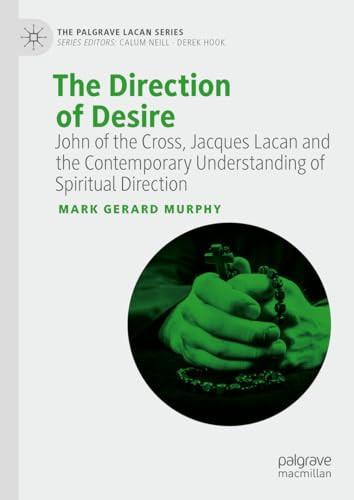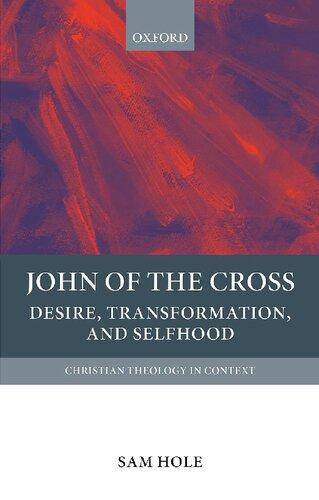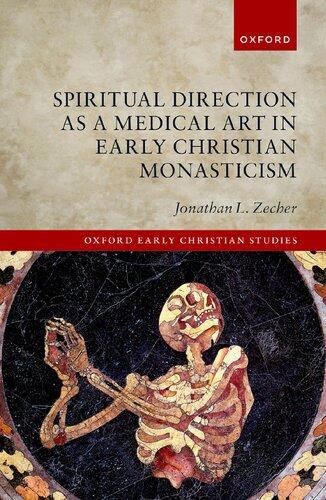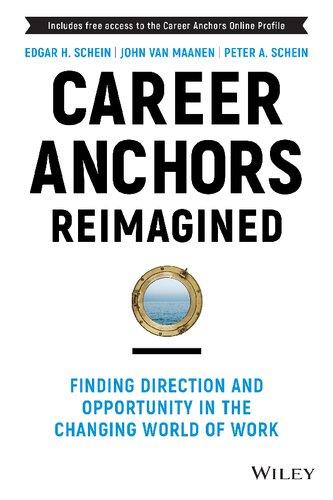Part I
The Loss of Mystical Desire in Christian Spiritual Direction
1
Foreword
Introduction
When I was younger, I sought out a spiritual director in Liverpool. He was the defnition of a traditional priest. He was already well in his nineties when I met him. At the time, I was reading spiritual guidance books—the book in question was called Anam Cara by John O Donohue. I remember telling him that I have never had an experience with God. At that specifc point, I was involved in charismatic groups that emphasised having a direct experience of the divine, and the absence of experience was causing me anxiety. I remember him looking at me puzzled and then saying in his gruf voice, ‘why dya think spirituality is all about experience? Why d’ya think Christ called out on the Cross, Mark?!’ His answer puzzled me as nearly all the books I picked up on popular spirituality and spiritual direction were centred on the elusive concept of religous experience. Looking back, I think I understand what he meant. Spirituality is less about the extraordinary experience—moments of inefable transient experiential encounter—and more about engaging in ordinary experience as such (see Lash, 1990). And part of that incarnational exploration of ordinary experience means encountering and taking account of our
© Te Author(s), under exclusive license to Springer Nature Switzerland AG 2023
M. G. Murphy, Te Direction of Desire, Te Palgrave Lacan Series, https://doi.org/10.1007/978-3-031-33107-7_1
M. G. Murphy
ordinary experiences ‘opacity.’ Our own experience has a certain ‘nothingness’ coiled at its centre.
Part of the message of incarnational theology is about the divine emptying themselves into creation. So then, Christologically speaking, we see an emptying of hypostasis on the Crucifx—a strange logic concerning the emptying of experience itself in confrontation with the very limits of human experience.
Even reading the great cataphatic English mystics of the Church like Julian of Norwich shows a certain morbidity in looking toward this ordinariness of experience (Julian of Norwich 2015). She prays that Christ lets her experience illness and sufering so that she can be more like him. And yes, certainly, it seems morbid from our modern perspective, but getting caught up in the melodramatic language of the anchorite belies the wider structural point. What is being highlighted here is that if we seek an experience of God, we seek frst the emptying of the will to experience itself. Te mystic surrenders their attachment to experience: they give up notions of heaven and God in favour of the love of God. And even as they move deeper into this love without telos, they relinquish the concept of love itself as a predicate of their old self. Tey give up everything for love, including love itself. In its place, from the position of the ‘no-one-anymore,’ the very love of God for God as defned by the trinity takes its place.
In short, my lack of experience and absence as I delved deeper into my faith became a source of refection. God was not there in the darkness; God was the darkness. God is not found in the desert; God is the desert. When I turn my eyes to heaven, I encounter frst the cross. Tis all sounds extremely disturbing, but is it? At Christianity’s very root (radix) is an injunction to love our neighbour. Our neighbour is anything but an encounter with someone I know; the neighbour is the stranger, the marginalised, the subaltern, the ostracised and the broken. Te stranger is an encounter with sufering and existence that forever remains a blinding darkness to me. And yet—still—I am implored to go out of myself toward the stranger in the opaque mundanity of their life, in all its fnitude. Tis is the etymological root of the word ecstasy—it does not mean a will to experience, but rather, it means to stand outside oneself.
My encounter with psychoanalysis—of the Lacanian variety—was similar. When I sought out analysis, I was going through a crisis and sought healing, an experience of relief; I wanted answers to help me ft my symptoms back into the weft and weave of my life. I expected my analyst to give me answers! Again, there was a refection of my frst encounter with my frst spiritual director. What became clear to me was that although such a drive to have existential meaning brought to me on a therapeutic plate was an important catalyst to get me speaking, part of the analytic process was about coming to terms with what Freud called the ordinariness of human sufering. It was also about learning that in Lacanian psychoanalysis, any reference to experientialism bolsters the ego, which is the opposite of clinical practice.
Tis book, then, is a refection of my own spirituality and also its encounter with psychoanalysis. It is about countering the modern tendency in spirituality and spiritual direction to seek extraordinary experiences or even rely on a phenomenological framework that centres human experience as such. It is important to say that this is not a diatribe against experience but rather an argument against the turn to experientialism in spirituality and commodifed therapeutic methods. Nor am I writing this as a spiritual director or a psychoanalyst. Instead, I am a theologian trained in spirituality, mystical theology, and philosophy. Many people— I am sure—will fnd my work problematic, but I ofer it as part of a wider conversation, and I come at such a project with humility.
Spirituality and psychoanalysis are both terms that cause anxiety due to the sheer level of indeterminacy associated with them. Te term spirituality having a much narrower sense in the past, associated with the religious life of the clergy, and thus related to what we call spiritual theology, contemplation, and the mystical tradition, has become more difuse in the twentieth century encompassing other elements, disciplines, and traditions. Te same can be said regarding psychoanalysis; from its beginnings with Freud, we see many talking cures and therapeutic disciplines. Te pure multiplicity and paucity of these two disciplines is a point of enrichment, but it also makes them vulnerable to co-option by market forces.
From a modern perspective, spiritual direction accompanies someone on their spiritual journey, providing guidance, support, and
encouragement as they deepen their relationship with a higher power. A trained spiritual director often conducts spiritual direction, helps individuals discern and interpret their experiences and responses to the divine, and provides insight into their spiritual growth. In recent years, some critics have argued that modern methods of spiritual direction have become overly psychological and have placed too much emphasis on experientialism. While psychological insights can help us understand how spiritual experiences impact our mental and emotional well-being, critics argue that focusing on therapy techniques and the need for immediate, tangible experiences can lead to a superfcial understanding of spirituality. Tis psychologism can result in people seeking instant gratifcation or quick fxes.
Our modern concept of the spiritual has long been defned by what we call the turn to experience. Schneiders argues that the turn to experience is synonymous with a widening of the term that takes it outside of the narrow defnitional remit that is limited to the study of Christian Teology. And within this broad defnition, we see that the concept of ‘experience’ is studied historically, anthropologically, and psychologically (Schneiders, 2005, pp. 1–12). Te turn to psychology for the basis of spirituality is crucial, not just in heuristic value—in terms of what studying spirituality as a category can yield from an academic perspective—but how its goals become psychologically and therapeutically defned. Indeed, it was not until the nineteenth century that we saw that the spiritual concept was less defned by institutional practices and more focused on feelings with the work of William James. Te latter was an American philosopher and psychologist and one of the most important thinkers of the late nineteenth and early twentieth centuries. He was particularly interested in the study of human consciousness and religious experience. James believed that religious experience was a legitimate and important feld of study and that it signifcantly impacted individuals and society. He argued that religious experiences could be studied scientifcally and were not limited to any particular religion. In his book Te Varieties of Religious Experience, James examined diferent types of religious experience, including mystical experiences, conversion experiences, and religious visions. He argued that a sense of unity, inefability, and a heightened sense of importance and reality characterised these experiences. James M. G. Murphy
also believed that religious experiences had practical implications for individuals and society and could lead to positive changes in behaviour and attitudes. He argued that religious experiences could help individuals to overcome personal difculties and to fnd meaning and purpose in life. Te problem is that many of his ideas have been co-opted by theological methods and fed back into pastoral practice.
Tis problem also extends to what we call mystical theology. Te tradition of mystical theology has its roots in early Christian mysticism. It can be traced back to the writings of Pseudo-Dionysius, a sixth-century theologian. Pseudo-Dionysius’s work is characterised by an apophatic approach to theology at the heart of the contemplative tradition. His ideas were deeply infuential in the development of the Christian mystical tradition, and his writings were widely read and studied throughout the Middle Ages; as we can see with the Victorines, the Cloud of Unknowing, Meister Eckhart and - in later centuries - John of the Cross, they were instrumental in shaping the mystical tradition, exploring the themes of union with God, detachment from material things, and the importance of prayer and contemplation. However, the mystical theological tradition has faced challenges over the years due to the modernisation and secularisation of society. As people began to rely more on scientifc reasoning and empirical evidence, the mystical approach to theology has been subject to misinterpretation and mistrust. Inwardness became synonymous with a focus on experientialism.
Additionally, the psychologisation of spirituality and the emphasis on individualism has further infuenced how the mystical tradition is perceived and practised more generally, especially concerning concepts such as ‘darkness.’ Tus, as Denys Turner has argued, we see the divine darkness—or nothingness—interpreted as an experience as such. Yet, in the past, such concepts were not about an experience of divine darkness but the darkness of experience itself (1995).
We see this in the eminent John of the Cross scholar—and Lacan’s teacher—Jean Baruzi who says: “I bring us a logic of mysticism and even a critique of mystic experience. Negation of all that appears. Nothing that appears to me is God?”(in McGinn 2017, p323). Nothingness is presented in a phenomenological feld. Indeed, there are many notes to this kind of experience of the nothing that appears in Baruzi’s work, but what is
M. G. Murphy
important is that it takes place within an experientialist methodological framework due to his reliance on the lived experience intuitionism of Bergson along with the work of William James (See Brassier, 2011 for a critique of Bergson’s intuitionism).
However, in the twentieth century, we see a shift where consumerism becomes associated with what we have hitherto called ‘the spiritual.’ Carrette and King state that:
What we call ‘individualist or consumerist spirituality’ here relates to a latetwentieth-century development within the broader historical phenomenon of ‘prosperity religions.’ It refers to those who embrace Capitalism, consumerism and individualism and interpret their religious or spiritual worldview in terms of these ideologies. Whereas the nineteenth-century prosperity religions were generally modernist in origin, the consumerist spiritualities emerged in the late 1960s and are generally ‘postmodern’ in orientation, emphasising eclecticism, individualist experimentation and a ‘pick and mix’ approach to religious traditions. (Carrette & King, 2004, p. 19)
Ronald Purser also argues that mindfulness has been appropriated by corporations, schools, governments, and the military as a tool for social control and self-pacifcation. He contends that if we harness mindfulness’s revolutionary potential, we must free it from its neoliberal shackles, releasing mindfulness for a collective awakening (Purser, 2019): He continues:
[Tis]amounts to what Byung-Chul Han calls “psycho-politics,” in which contemporary Capitalism seeks to harness the psyche as a productive force. Mindfulness-based interventions fulfl this purpose by therapeutically optimising individuals to make them “mentally ft,” attentive and resilient so they may keep functioning within the system. Such capitulation seems like the farthest thing from a revolution and more like a quietist surrender. (Purser, 2019, p. 15)
However, these important critiques miss out on how these modern forms of spirituality have fused with the digital character of our age. What we call the attention economy has aided the growth of these
modern forms of spirituality with its intense focus on experientialism, online digital content and social media platforms and the injunction to write endlessly (Pine & Gilmore, 2011; Seymour, 2019). As a modern form of secular spiritual direction, the self-help industry has greatly benefted from the growth of digital technology. Digitality has made self-help and spiritual resources more accessible, afordable, and convenient than ever. Te internet has allowed self-help content creators to reach a broader audience, and people can access self-help resources anytime and anywhere. Social media platforms have become popular channels for sharing self-help content, and many self-help experts ofer online courses and webinars on various topics. Digital publishing has made it easier and cheaper for authors to self-publish and distribute their work, and e-books and audiobooks are widely used formats for self-help content.
Additionally, many self-help apps are available on app stores like Google Play and the App Store. Tese apps ofer features like guided meditations, goal-setting tools, and habit trackers to help people improve their mental health, productivity, and personal growth. Overall, the growth of digital technology has made self-help resources more widely available and accessible, allowing the industry to reach more people and grow at an unprecedented pace.
Te digital self-help and spirituality industry has thus grown exponentially with the polarisation of politics resulting from the precarity of ubiquitous economic alienation. In addition, the pandemic has opened wellness gurus to peddle their immune-boosting tonics and proselytise to a newly receptive online audience saddled with anxiety (McBain, 2020).
I argue that a radical form of spiritual direction would problematise these experientialist foundations. To do this, I rely on radically reimagining spiritual direction and its relation to the talking cures. I bring together two thinkers suspicious of experientialism in both felds: Lacan and John of the Cross. Although modern spiritual direction often incorporates experientialist forms of psychology, the use of Lacanian analysis as a relevant tool is largely ignored. Moreover, while a cultural studies variant of Lacan is sometimes considered in theological discourse, this approach tends to be limited to high systematic or political theology. Te clinical Lacan is not typically integrated into pastoral theological practices. As a
M. G. Murphy
result, the value of Lacanianism for theology is not fully realised in many contemporary spiritual direction contexts.1
Jacques Lacan was a prominent psychoanalyst who developed a method of psychoanalysis that focused on language, culture, and social structures rather than on individual experience. He was critical of a focus on experientialism in forms of psychology and interpretations of Freud. According to Lacan, the unconscious is structured like a language, and our experiences and emotions are shaped and mediated by the linguistic and cultural structures in which we live. In this way, Lacan’s psychoanalytic method avoids the pitfalls of experientialism, which places too much emphasis on individual experiences and emotions.
Lacan’s approach to psychoanalysis emphasises the importance of the symbolic realm, or the realm of language, as a mediator of our experiences and emotions. By understanding the linguistic and cultural structures that shape our unconscious, we can gain insight into the patterns and behaviours we may not be aware of on a conscious level. Lacan believed that psychoanalysis aimed to help individuals gain awareness of the symbolic, linguistic structures that shape their experience. Tis structure is what Lacan identifed as desire, which is not reducible directly to the afective.
Lacan’s psychoanalytic method is, therefore, less concerned with the experiential aspects of individual emotional experiences and more about understanding the larger cultural and linguistic structures that shape our unconscious.
John of the Cross (1542–1591) was a Spanish mystic and poet and one of the most important fgures of the Counter-Reformation. He was a member of the Catholic religious order of the Discalced Carmelites, which he co-founded with Saint Teresa of Ávila. For John, desire is related to the whole structure of a person, and the intensifcation of desire involves emptying out the heart’s caverns. Tis process exposes desire as a
1 For example, at a pastoral theology conference about spiritual direction and psychotherapy, I was asked what my research was about. I said,’ Well, it is about psychoanalysis and spiritual direction.’ Tey then asked, ‘Oh, what school of analysis?’ I said, ‘Lacanian.’ Te person furrowed their brow and said, ‘oh, I am not a philosopher.’ Another time, during another conference, I told an academic who was working in the philosophical-theological tradition about my work, and they said, ‘I would be very wary of using Lacan as a clinician, as the concept of subjective destitution concerning the dark night of the soul is very dangerous.’
force that strips away the epistemological structures of the self rather than a yearning for nothingness or “an experience of nothing.”
I argue that this focus on emptiness, or “kenosis,” plays a key role in John’s development of desire and its connection to the psychoanalytic concept of subjective destitution. Tis focus is also implicitly present in Lacan’s Mystical Seminar, which—I argue—implicitly critiques mystical phenomenology. Te graph of sexual relation references John’s concept of todo-nada (all or nothing), which Lacan reinterprets as the all and the not-all.
Implicitly, in Lacan’s mystical seminar, he shows how any conception of the mystical must have failure built into it. As Alois M. Haas has refected, “the hidden character of mystical experience is that it is also a non-experience” (in McGinn, 2017, p. 263). In other words, following Lacan’s famous formulation, the heart of John’s mystical theology, and, by implication, spiritual direction, there is no such thing as a spiritual experience, but there is such a thing as transformation. As Largier says in his book Figures of Possibility:
the mystics argue not for a return to this lost sphere of a vision of essences, a prelapsarian state but for a transformation of the world in practices of devotion. (2022, p. 37)
Tis book attempts to reclaim a radical spiritual direction that rejects the commercialisation of spirituality and its overemphasis on experientialism. Rather than retreating to an imagined fundamentalist past, the book returns to the works of John of the Cross through Lacan. Both Lacan and John were masters of desire and viewed their respective disciplines as directing desire. However, they were also wary of locating desire solely at the level of emotion or “afect.”
In the second chapter, I argue that emotional content has become a powerful tool for people in social life and has even become a spiritual currency in our contemporary society. Next, I discuss the implications of this shift in how we perceive and interact with our modern environment, and this sets the stage for the rest of the book.
In the third chapter, I provide an alternative spiritual direction approach incorporating modern insights. Tis new approach understands 1 Foreword
M. G. Murphy
desire as an ontological aspect of the person rather than merely a psychological faculty. I explore the ideas and theories of modern scholars and provide an analysis of their approach to spiritual direction and how it difers from the traditional, pre-modern paradigm. It also gives an account of John’s life and key texts.
In the fourth chapter, I explore the work of Jacques Lacan as a potential partner for a linguistically focused form of Juanist spiritual direction. First, I give a brief biographical sketch of Lacan’s academic development and an overview of his main ideas before illustrating the practice of managing desire in a psychoanalytic setting.
In the ffth chapter, I explore Lacan’s conception of psychoanalysis and its relation to spiritual direction by relating it to the concept of performative discourse. Finally, I closely read a crucial paragraph from Lacan’s seminal text “Psychoanalysis and its Teaching” to demonstrate that Lacan understood spiritual direction relating to desire as non-afective. Tis sets the groundwork for exploring Lacan and his relation to spiritual direction via John of the Cross, his mentor Jean Baruzi, and peer Georges Bataille.
Chapter 6 explores how Lacan developed the structure of Juanist mystical speech for psychoanalysis, tracing the infuence of Baruzi and Bataille. I map out the structure of mystical speech as a function of language and locate it within Lacan’s concept of the four discourses to draw out the implicit mystical theology within Lacan’s clinical concepts and practice. I argue that John and Lacan spoke of the not-all/todo-nada and that this linguistic excess of subjectivity should be considered a performative discourse and mode of speech rather than an experientialist one. I conclude by interpreting the four discourses as the four discourses of Juanist-Lacanian spiritual direction.
In the seventh and fnal chapter, I ofer practical strategies for a JuanistLacanian approach to spiritual direction. Tese strategies draw from the mystical strategies of unknowing listed in Chap. 3 and Lacan’s psychoanalytic rhetoric of not-knowing listed in other chapters. Tey are split into listening and speaking techniques, with the director listening to the directee’s rhetoric of not-knowing and using strategies of oracular intervention to pierce the defences of not knowing through the mystical strategies of unknowing. Tis practical guide aims to aid in achieving what I





















